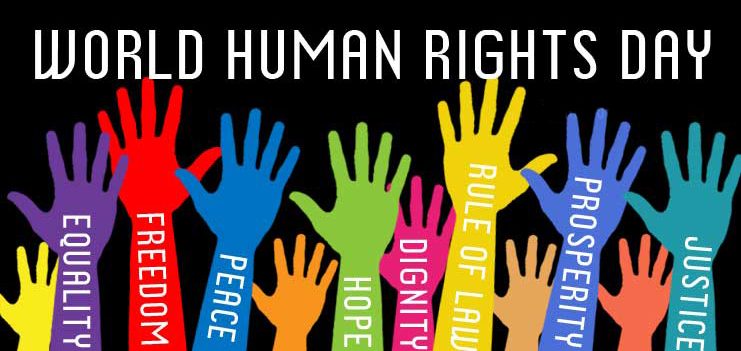December 6, 2021
Reducing Inequalities, Advancing Human Rights
 Each year on December 10th, the United Nations, countries, and individuals worldwide commemorate Human Rights Day to recognize the importance of human rights in building the world we envision, and to highlight the need for global solidarity and shared humanity to foster a better world.
Each year on December 10th, the United Nations, countries, and individuals worldwide commemorate Human Rights Day to recognize the importance of human rights in building the world we envision, and to highlight the need for global solidarity and shared humanity to foster a better world.
December 10 is significant as the day in 1948 when the United Nations General Assembly adopted the Universal Declaration of Human Rights (UDHR). The UDHR was groundbreaking as a milestone document that proclaims the inalienable rights that every individual is entitled to, regardless of race, religion, sex, language, political opinion, nationality, property, birth, or other status. It is also the most translated document in the world, being available in more than 500 languages.
 “Where, after all, do universal human rights begin? In small places, close to home — so close and so small that they cannot be seen on any maps of the world. […] Unless these rights have meaning there, they have little meaning anywhere. Without concerted citizen action to uphold them close to home, we shall look in vain for progress in the larger world.” – Eleanor Roosevelt
“Where, after all, do universal human rights begin? In small places, close to home — so close and so small that they cannot be seen on any maps of the world. […] Unless these rights have meaning there, they have little meaning anywhere. Without concerted citizen action to uphold them close to home, we shall look in vain for progress in the larger world.” – Eleanor Roosevelt
2021: The Year of Equality
Human Rights Day this year is centered around the theme of equality. Article 1 of the UDHR–”All human beings are born free and equal in dignity and rights”– shapes the principles of equality and nondiscrimination in our society and human rights advocacy.
Within the past year alone and since the onset of the COVID-19 pandemic, violations to human rights and equality has persisted in both the United States and worldwide:
- The Covid-19 pandemic has disproportionately impacted racial and ethnic minorities, primarily Black, Latinx, and Native communities, which have faced an increased risk for infection, serious illness, and death from the disease, as well as severe economic impacts. These disparities are linked to longstanding inequities in health outcomes and access to care, education, employment, and economic status.
- The pandemic and public health measures essential to slow its spread resulted in lost wages or jobs, reduced health coverage, and reduced access to other essential goods and services. People of color—especially women and immigrants—comprised the majority of employment in low-wage service jobs, putting them at greater risk of outbreaks in addition to unsafe working conditions.
- The Washington Post database has documented about 1,000 killings by shootings each year within the past five years in the United States, revealing the significant racial disparities, police violence, and vicious cycle of incarceration that persists in our country.
Equality is aligned with the 2030 UN Sustainable Development Agenda and is interconnected with addressing and developing solutions for systemic forms of discrimination that impacts vulnerable populations globally, including women and girls, indigenous peoples, LGBTI people, migrants, people with disabilities, and many more.
This is a call to action to end poverty, protect our planet, and improve the quality of life for all individuals everywhere.
Equality, inclusion, and non-discrimination is ultimately the most effective and sustainable way to reduce inequality and continue our path towards achieving the 2030 Agenda. In order to achieve these goals and progress towards a just and equitable world, we must take action and advocate for not only our human rights, but the human rights of others.
Get Involved
- Participate in UN Human Rights live Q&A on December 10 with High Commissioner Michelle Bachelet, who will answer your questions on human rights and equality; the event will take place across all of their social media platforms
- Explore UN Exhibits on Human Rights to view the works of talented amateur and professional photographers capturing human rights topics globally
- Promote #HumanRightsDay2021 on your social media to spread awareness
- Stay educated and up to date with current global events and issues surrounding human rights
- Volunteer in your local community with organizations advocating for human rights and equality
Support
Consider making a one-time contribution or setting up payroll deduction to one of our CFD member organizations working to advocate for human rights and fighting against inequality and discrimination:
Amnesty International USA (charity code 0315596): Our history spans 60 years and includes a presence in over 70 countries and 10 million supporters. We defend the human rights of people globally
Center for Constitutional Rights Inc (charity code 0456915): s a non-profit legal and educational organization dedicated to protecting and advancing the rights guaranteed by the U.S. Constitution and the Universal Declaration of Human Rights.
Freedom House, Inc. (charity code 1481532): We empower frontline activists and civil society organizations to uphold fundamental human rights and to advance democratic change.
MADRE, Inc. (charity code 1478345): is an international women’s human rights organization. We partner with community-based women’s groups worldwide facing war and disaster with our sister organizations. Our mission is to advance women’s human rights by meeting urgent needs in communities and building lasting solutions to the crises women face.
Peace Development Fund (charity code 1479284): We provide grants, training and other vital resources necessary to community organizations working on peaceful conflict resolution, human rights and environmental sustainability in the U.S.
University of Washington Center for Human Rights (charity code 1480861): Used to help fund the operating expenditures of the UW Center for Human Rights.
 Contributed by UWCFD student intern Katerina Dang. Katerina hails from the Bay Area and is a senior majoring in Psychology and minoring in Global Health. She hopes to be in graduate school in fall of 2022 earning a Master of Public Health in Health Management.
Contributed by UWCFD student intern Katerina Dang. Katerina hails from the Bay Area and is a senior majoring in Psychology and minoring in Global Health. She hopes to be in graduate school in fall of 2022 earning a Master of Public Health in Health Management.